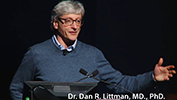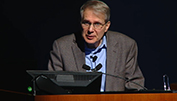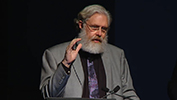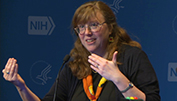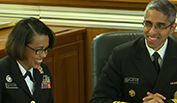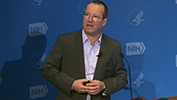-
- NIH VideoCast - Demystifying Medicine 2017: Inflammation and Pancreatic Cancer
-
- - Christine Alewine, MD, PhD, NCI, NIH and S. Perwez Hussain, PhD, NCI, NIH (2017/02/24)
- - Category : Demystifying Medicine
- The Demystifying Medicine Lecture Series is designed to help bridge the gap between advances in biology and their applications to major human diseases. Each lecture will feature a presentation on a major disease, including current research and advancements on treatments.
For more information go to https://demystifyingmedicine.od.nih.gov
NIH VideoCast - Demystifying Medicine 2017: Inflammation and Pancreatic Cancer
-
- NIH VideoCast - CC Grand Rounds: (1) SGLT2 Inhibitors: A Case Study in Developing Innovative Therapies for Diabetes and (2) Clinical Studies into Biological Mechanisms Mediating SGLT2 Inhibitors` Adverse Effects on Bone Health
-
- - (1) Simeon Taylor, MD, PhD Special Volunteer, Diabetes, Endocrinology, and Obesity Branch, NIDDK, NIH and (2) Jenny Blau, MD Associate Program Director, Inter-Institute Endocrine Training Program; Co-Chief, Internal Medicine and Endocrinology and Staff Clinician, NICHD, NIH (2017/02/24)
- - Category : Clinical Center Grand Rounds
- CC Grand Rounds: (1) SGLT2 Inhibitors: A Case Study in Developing Innovative Therapies for Diabetes and (2) Clinical Studies into Biological Mechanisms Mediating SGLT2 Inhibitors` Adverse Effects on Bone Health
For more information go to http://www.cc.nih.gov/about/news/grcurrent.html
NIH VideoCast - CC Grand Rounds: (1) SGLT2 Inhibitors: A Case Study in Developing Innovative Therapies for Diabetes and (2) Clinical Studies into Biological Mechanisms Mediating SGLT2 Inhibitors` Adverse Effects on Bone Health
-
- NIH VideoCast - The microbiota as instructor and arbiter of immune responses in health and disease
-
- - Dan R. Littman, M.D., Ph.D., Investigator, Howard Hughes Medical Institute; Kimmel Professor of Molecular Immunology at New York University School of Medicine (2017/02/24)
- - Category : WALS - Wednesday Afternoon Lectures
- NIH Director`s Wednesday Afternoon Lecture Series
The vertebrate intestinal tract is colonized by hundreds of species of bacteria that outnumber the total cells in the host, yet must be compartmentalized and tolerated to prevent invasive growth and harmful inflammatory responses. A key function of commensal microbes is to contribute to the adaptive immune repertoire and to diverse lymphocyte effector functions. T cell responses against non-invasive commensals contribute to shaping the repertoire of effector/memory and regulatory T cells. How T cells elicited by commensal bacteria can influence autoimmunity is a central question that remains unsolved. The Littman Lab studies the antigenic specificity of microbiota-induced T cells and the mechanisms by which their functions are acquired upon interaction with distinct commensal species. His lab finds that Th17 cells, which are central to mucosal barrier defense but also participate in autoimmune disease, are induced by specific constituents of the microbiota, and acquire effector function only after additional exposure to endogenous adjuvants, such as the serum amyloid A proteins. The lab`s studies in mice are not only relevant for human autoimmune diseases, many of which have Th17 cell involvement, but may also provide insights into how commensal microbe-specific T cell responses could be harnessed for mucosal vaccination and cancer immunotherapy.
For more information go to https://oir.nih.gov/wals/2016-2017
NIH VideoCast - The microbiota as instructor and arbiter of immune responses in health and disease
-
- NIH VideoCast - NIH BRAIN Initiative Multi-Council Working Group Meeting - February 2017 (Day 2)
-
- - National Institutes of Health (2017/02/17)
- - Category : Advisory Board Meetings and Workshops
- The BRAIN Multi-Council Working Group ensures a coordinated and focused effort across NIH. The Multi-Council Working Group provides ongoing oversight of the long-term scientific vision of the BRAIN Initiative, as endorsed by the ACD, in the context of the evolving neuroscience landscape. Additionally, the working group regularly offers an assessment of the progress of current projects and programs supported by the BRAIN Initiative. The group will meet to provide insight on the progress of BRAIN.
For more information go to https://braininitiative.nih.gov/about/mcwg.htm
NIH VideoCast - NIH BRAIN Initiative Multi-Council Working Group Meeting - February 2017 (Day 2)
-
- NIH VideoCast - Clinicopathologic Grand Rounds: Clinical Cases from the NIH Clinical Center: Familial Small Intestinal Neuroendocrine Tumor: A Novel Intestinal Zebra
-
- - (1) Ehsan Chitsaz, MD, Clinical Fellow, Digestive Diseases Branch, NIDDK, NIH (2) Marybeth Hughes, MD, FACS, Chief, Surgical Oncology, East Virginia Medical School (3) Stephen Wank, MD, Senior Investigator and Chief, Digestive Diseases Branch, NIDDK, NIH (2017/02/17)
- - Category : Clinical Center Grand Rounds
- Clinicopathologic Grand Rounds: Clinical Cases from the NIH Clinical Center: Familial Small Intestinal Neuroendocrine Tumor: A Novel Intestinal Zebra
For more information go to http://www.cc.nih.gov/about/news/grcurrent.html
NIH VideoCast - Clinicopathologic Grand Rounds: Clinical Cases from the NIH Clinical Center: Familial Small Intestinal Neuroendocrine Tumor: A Novel Intestinal Zebra
-
- NIH VideoCast - National Cancer Advisory Board Virtual Meeting - February 2017
-
- - NCI, NIH (2017/02/17)
- - Category : National Cancer Advisory Board
- The 6th Virtual Meeting of the National Cancer Advisory Board
NIH VideoCast - National Cancer Advisory Board Virtual Meeting - February 2017
-
- NIH VideoCast - New antibiotics from the microbial dark matter
-
- - Kim Lewis, Ph.D., Director, Antimicrobial Discovery Center, Northeastern University (2017/02/17)
- - Category : WALS - Wednesday Afternoon Lectures
- NIH Director`s Wednesday Afternoon Lecture Series
We are experiencing an antibiotic crisis: Our ability to discover novel compounds has diminished and pathogens go largely unchecked in acquiring and spreading resistance. The main source of antibiotics???soil actinomycetes???has been overmined. In chronic infections, the problem is compounded by the presence of dormant persister cells that are resistant to all antibiotics. As a result, chronic osteomyelitis or infections in patients with cystic fibrosis can be untreatable. About 99 percent of environmental microorganisms are uncultured. Dr. Lewis???s lab developed approaches for killing persister cells and growing uncultured bacteria. The lab found that this "microbial dark matter" harbors novel antimicrobials that evolved to be essentially free of resistance.
For more information go to https://oir.nih.gov/wals/2016-2017
NIH VideoCast - New antibiotics from the microbial dark matter
-
- NIH VideoCast - Control of T Helper Type 2 Responses by Dendritic Cells
-
- - Dr. Beatriz Leon Ruiz, Assistant Professor, University of Alabama at Birmingham School of Medicine (2017/02/17)
- - Category : Immunology
- Immunology Interest Group Seminar Series
In my laboratory the focus will be on two main areas of research: (1) the mechanisms determining the commitment and plasticity of memory follicular helper CD4 T cells (Tfh) cells and their role in allergy, and (2) the roles that dendritic cell (DC) subpopulations play in the induction of T Helper 2 (Th2) responses to common allergens that trigger allergic asthma. Our data indicate that IL-4-committed Tfh cells are precursors of house dust mite (HDM)-specific Th2 cells and reveal an unexpected role of B cells and Tfh cells in the pathogenesis of allergic asthma. In addition, new data show that airway exposure levels of endotoxin provide different protection against asthma and allergies in adults and infants and suggest that infants are more vulnerable to prime type 2 cell dominant responses to inhaled allergens in the presence of low dose endotoxin. Endotoxin induces different activation of DCs subpopulations in infant and adults, thus inducing different activation of allergen-specific T cell responses. Thus, the levels of environmental endotoxin during infancy are critical to fine-tune DC activation and protect from allergy.
NIH VideoCast - Control of T Helper Type 2 Responses by Dendritic Cells
-
- NIH VideoCast - NIH BRAIN Initiative Multi-Council Working Group Meeting - February 2017 (Day 1)
-
- - National Institutes of Health (2017/02/16)
- - Category : Advisory Board Meetings and Workshops
- The Neuroethics Division of the BRAIN Multi-Council Working Group (MCWG) recommends overall approaches for how the NIH BRAIN Initiative might handle issues and problems involving ethics. The Division has regular meetings to address the following charges:
Recommend overall approaches for how the BRAIN Initiative should handle issues and problems involving ethics.
Inform the MCWG and NIH on research questions important for BRAIN that could be answered through focused Funding Opportunity Announcements.
Consider proposed funding areas for BRAIN projects for questions of ethical risk.
Examine selected projects or applications for ethical concerns and, when appropriate, provide an ethics consultation.
Draft relevant guidance documents to address critical ethical issues associated with BRAIN research.
For more information go to https://braininitiative.nih.gov/about/neuroethics.htm
NIH VideoCast - NIH BRAIN Initiative Multi-Council Working Group Meeting - February 2017 (Day 1)
-
- NIH VideoCast - Collaboration and Curation: Creating the Exhibition Collaboration and Care
-
- - Loren Miller, PhD, Curatorial Assistant, Smithsonian National Museum of African American History and Culture (2017/02/16)
- - Category : History of Medicine
- NLM History of Medicine Lecture
In 1967, when the first three physician assistants (PAs) graduated from Duke University, it marked the birth of a new profession. In honor of the field???s 50th anniversary, the National Library of Medicine (NLM) and the Physician Assistant Historical Society (PAHx) partnered to create an exhibition commemorating and celebrating the history of PAs. This lecture will discuss the process of developing the exhibition, Physician Assistants: Collaboration and Care, as a joint endeavor and the importance of shared authority in creating a successful exhibit. It will explore how the organizational partnership combined NLM and PAHx???s resources, knowledge, and archives in order to create the strongest exhibition possible, which represented both organizations??? needs and goals. By practicing shared authority, NLM and PAHx combined the profession???s history and prominent themes to produce an engaging exhibit that will appeal to experts and general audiences, and perhaps inspire a new generation of PAs.
For more information go to https://www.nlm.nih.gov/hmd/happening/lectures/lectures_2017.html
NIH VideoCast - Collaboration and Curation: Creating the Exhibition Collaboration and Care
-
- NIH VideoCast - Demystifying Medicine 2017: Inflammation: One Gene at a Time
-
- - Dan Kastner, MD, PhD, NHGRI, NIH (2017/02/16)
- - Category : Demystifying Medicine
- The Demystifying Medicine Lecture Series is designed to help bridge the gap between advances in biology and their applications to major human diseases. Each lecture will feature a presentation on a major disease, including current research and advancements on treatments.
For more information go to https://demystifyingmedicine.od.nih.gov/
NIH VideoCast - Demystifying Medicine 2017: Inflammation: One Gene at a Time
-
- NIH VideoCast - National Advisory Neurological Disorders and Stroke (NANDS) Council - February 2017
-
- - National Institute of Neurological Disorders and Stroke, NIH (2017/02/14)
- - Category : National Institute of Neurological Disorders and Stroke
- The 198th meeting of the National Advisory Neurological Disorders and Stroke Council on February 9, 2017.
For more information go to http://www.ninds.nih.gov/find_people/nands/index.htm
NIH VideoCast - National Advisory Neurological Disorders and Stroke (NANDS) Council - February 2017
-
- NIH VideoCast - All of Us Funding Opportunity Webinar
-
- - NIH (2017/02/14)
- - Category : Special
- All of Us Funding Opportunity
NIH VideoCast - All of Us Funding Opportunity Webinar
-
- NIH VideoCast - NLM Board of Regents Meeting - February 2017 (Day 2)
-
- - NLM, NIH (2017/02/10)
- - Category : Advisory Board Meetings and Workshops
- NLM Advisory Council Meeting
For more information go to https://www.nlm.nih.gov/od/bor/bor.html
NIH VideoCast - NLM Board of Regents Meeting - February 2017 (Day 2)
-
- NIH VideoCast - The future of genetic codes and BRAIN codes
-
- - George M. Church, Ph.D., Professor of Genetics, Harvard Medical School (2017/02/10)
- - Category : WALS - Wednesday Afternoon Lectures
- Marshall W. Nirenberg Lecture
This lecture, established in 2011, recognizes Marshall Nirenberg for his work to decipher the genetic code, which resulted in his receiving the 1968 Nobel Prize in Physiology or Medicine. Nirenberg`s research career at the NIH spanned more than 50 years, and his research also focused on neuroscience, neural development, and the homeobox genes. The Nirenberg lecture recognizes outstanding contributions to genetics and molecular biology.
Dr. Church is a professor of genetics at Harvard Medical School and director of PersonalGenomes.org, which provides the world`s only open-access information on human genomic, environmental, and trait data (GET). His 1984 Harvard Ph.D. thesis included the first methods for direct genome sequencing, molecular multiplexing, and barcoding. These methods led to the first genome sequence (pathogen, Helicobacter pylori) in 1994. His innovations have contributed to nearly all "next generation" DNA sequencing methods and companies. These innovations plus his lab`s work on chip-DNA-synthesis, gene editing, and stem cell engineering resulted in founding additional application-based companies spanning the fields of medical diagnostics and synthetic biology/therapeutics. He has also pioneered new privacy, biosafety, ELSI, environmental, and biosecurity policies. He is director of an IARPA BRAIN Project and the NIH Center for Excellence in Genomic Science. His honors include election to National Academy of Sciences and the National Academy of Engineering. He is also a Franklin Bower Laureate for Achievement in Science. He has co-authored 425 papers, 95 patent publications, and one book (Regenesis).
Dr. Church`s lecture will focus on transformative technologies moving at exponential rates for reading, writing and editing genomes, epigenomes, and other omes. Applications include cells resistant to all viruses via new genetic codes, production and analysis of organs for transplantation, and therapy testing.
For more information go to https://oir.nih.gov/wals/2016-2017
NIH VideoCast - The future of genetic codes and BRAIN codes
-
- NIH VideoCast - Oh to be seventeen again: IL-17 signaling in fungal immunity and autoimmune disease
-
- - Sarah Gaffen, PhD, Professor of Rheumatology, University of Pittsburg (2017/02/10)
- - Category : Immunology
- Immunology Interest Group Seminar Series
The IL-17 family constitutes a distinct subclass of pro-inflammatory cytokines with unique structures and signaling properties. Signals from IL-17 mediate immunity to extracellular pathogens, particularly the commensal fungus Candida albicans. Conversely, dysregulated IL-17 signal transduction drives pathogenesis in autoimmune conditions, including psoriasis. This talk will discuss both sides of this dual-acting cytokine, from the perspective of IL-17 receptor-induced signal transduction mechanisms.
Biography: Dr. Sarah Gaffen received her BS in Biological Sciences from Carnegie Mellon University and her PhD in Molecular and Cellular Biology from the University of California at Berkeley. After a postdoctoral fellowship at the Gladstone Institute for Virology and Immunology at UC San Francisco working on IL-2 and JAK-STAT signaling in T cells, she joined the faculty at the University at Buffalo, State University of New York Dental School. At this time, Dr. Gaffen initiated studies on a then-obscure cytokine, IL-17, and its role in oral mucosal immunity. Her group was the first to demonstrate a host-protective role for IL-17 in acute periodontal disease and in immunity to the commensal fungus, Candida albicans, causative agent of oral thrush. She was also one of the first people to delineate signaling mechanisms mediated by the IL-17 receptor complex. In 2008 she re-located to the University of Pittsburgh, Division of Rheumatology and Clinical Immunology, where she is now the Gerald P. Rodnan Professor of Rheumatology and Director of Basic Rheumatology Research. Her group continues to study IL-17 signaling in both fungal immunity and in autoimmune disease.
NIH VideoCast - Oh to be seventeen again: IL-17 signaling in fungal immunity and autoimmune disease
-
- NIH VideoCast - NLM Board of Regents Meeting - February 2017 (Day 1)
-
- - NLM, NIH (2017/02/09)
- - Category : Advisory Board Meetings and Workshops
- NLM Advisory Council Meeting
For more information go to https://www.nlm.nih.gov/od/bor/bor.html
NIH VideoCast - NLM Board of Regents Meeting - February 2017 (Day 1)
-
- NIH VideoCast - Contemporary Clinical Medicine: Great Teachers: The NIH Clinical Center`s 2017 Distinguished Clinical Research Scholar and Educator in Residence Lecture: The Changing Landscape of Cancer Drug Resistance
-
- - Charles L. Sawyers, MD, Investigator, Howard Hughes Medical Institute Marie-Jos??e and Henry Kravis Chair in Human Oncology and Pathogenesis, Chairman, Human Oncology and Pathogenesis Program, Memorial Sloan Kettering Cancer Center (2017/02/09)
- - Category : Clinical Center Grand Rounds
- Contemporary Clinical Medicine: Great Teachers: The NIH Clinical Center`s 2017 Distinguished Clinical Research Scholar and Educator in Residence Lecture The Changing Landscape of Cancer Drug Resistance
For more information go to http://www.cc.nih.gov/about/news/grcurrent.html
NIH VideoCast - Contemporary Clinical Medicine: Great Teachers: The NIH Clinical Center`s 2017 Distinguished Clinical Research Scholar and Educator in Residence Lecture: The Changing Landscape of Cancer Drug Resistance
-
- NIH VideoCast - The Various Roles of Nanoscale AMPA Receptor Dynamics in Synaptic Plasticity
-
- - Daniel Choquet, Ph.D., Researcher, Interdisciplinar Institute of Neuroscience, University of Bordeaux (2017/02/07)
- - Category : Neuroscience
- NIH Neuroscience Series
Robert Newcomb Memorial Seminar
Dr. Choquet???s lab has a transdisciplinary approach to study the interplay between the organizational dynamics of the molecular components of glutamatergic synapses and synaptic transmission. Their projects build on their recent findings that: trafficking of neuronal molecules such as glutamate receptors is highly dynamic, regulations of protein-protein interactions play key roles in the control of this trafficking at different steps, including lateral diffusion, endo and exocytosis, modulation of glutamate receptor trafficking has a profound impact on synaptic transmission, including on both short and long term post-synaptic plasticity.
By combining the expertise of chemists, biochemists, cell biologists, biophysicists and neurophysiologists, they will develop 3 main research axes: dynamics and physical-chemistry of the macro-molecular complexes of the synapse, nano-scale organization and dynamics of synaptic proteins and membrane trafficking, impact of the dynamic of synapse organization on synaptic physiology.
Results obtained in these three axes will be constantly integrated to provide a global view of glutamatergic synapse physiology, from nano-scale interactions to function.
For more information go to https://neuroscience.nih.gov/neuroseries/Home.aspx
NIH VideoCast - The Various Roles of Nanoscale AMPA Receptor Dynamics in Synaptic Plasticity
-
- NIH VideoCast - The Role of Sleep in Health
-
- - Michael J. Twery, Ph.D., National Heart, Lung, and Blood Institute, NIH (2017/02/07)
- - Category : Focus on You Wellness
- Focus on you wellness lecture
Health and wellness lecture in observance of American Heart Month.
Are you not getting enough sleep? If so, join the National Heart, Lung, and Blood Institute`s (NHBLI) foremost expert on sleep research, Michael J. Twery, Ph.D., to learn what`s at stake for your heart ??? and what you can do to get your sleep on track.
Learn how inadequate sleep affects your body chemistry. Did you know that your heart and blood vessels lose some of their ability to fight damage? Did you also know that not enough sleep can lead to stress, overeating, weight gain and even obesity? Dr. Twery will also talk about new discoveries that highlight the critical roles natural light, a regular sleep schedule, wholesome eating, and exercise can play in helping you feel rested each morning ??? and heart-healthy over your lifetime.
NIH VideoCast - The Role of Sleep in Health





